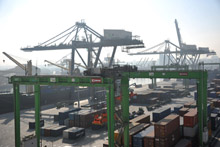
Typical street scene in Santa Ana, El Salvador. (Photo: iStock)
IMF Survey: Closer Ties among Maghreb Economies Would Spur Growth
January 17, 2013
- Greater integration would lead to better opportunities and higher growth in the Maghreb
- Maghreb countries need reforms to increase foreign direct investment inflows
- A more transparent economic model key to more equitable growth
Increased openness is the way forward for the Maghreb in order to boost growth and employment, IMF Managing Director Christine Lagarde said in Nouakchott, Mauritania last week.

The harbor of Casablanca, Morocco. Maghreb region needs to increase economic ties, including trade and investments, within itself and with the world (Photo: Frank May/Newscom)
LAGARDE IN MAGHREB
The IMF chief, who attended the fifth regional conference of finance ministers and central bank governors of the Maghreb countries, co-hosted by the Central Bank of Mauritania and the IMF, acknowledged that political difficulties remained an important obstacle to greater integration in the Maghreb region. But she expressed hope that joint projects, such as the Maghreb Bank for Investment and Foreign Trade—whose structure and capitalization ($100 million) was formally agreed upon during the conference—would help improve integration gradually.
“A better-integrated Maghreb would allow countries to focus on their strengths. It would help the region stand against unfavorable external economic conditions, and would ultimately lead to more growth and jobs,” Lagarde told the conference.
Conference participants comprised government officials and private-sector representatives from all five Maghreb countries —Algeria, Libya, Mauritania, Morocco, and Tunisia. Discussions focused on economic integration and the role of foreign direct investment in particular.
Foreign investments are vital
At nearly $6.5 billion (less than 2 percent of the region’s GDP), the level of foreign direct investment in the Maghreb is low compared to that in other regions, such as Asia and Latin America.
Lagarde emphasized that greater regional integration is needed to foster foreign direct investment and help spur growth. “Not one single country in the Maghreb is large enough to attract foreign investment on the scale needed to accelerate job creation, and a united Maghreb will help foster investment from abroad,” the IMF chief told conference participants.
“For the level of foreign direct investment to increase, Maghreb countries need to improve the business environment, make customs and taxation rules more transparent, make the judicial system more predictable and independent, and harmonize investment rules across the region,” Lagarde said. She also encouraged policymakers in the region to continue to diversify the sources of, and sectors for, foreign direct investment. “This would help the region avoid heavy reliance on a certain geographic area or industry,” she added.
Maghreb needs new economic model
Against the backdrop of the unprecedented social and political transformation across the region, the IMF chief pressed for continued economic reforms to ensure that the benefits of economic growth are more broadly shared among all segments of the population.
“Over the past two years, citizens from all across the region stood up and spoke out for greater dignity, opportunity, and equity in economic life. The region, indeed, needs a new economic model that is based on transparency and fairness. I am encouraged by the commitment of policymakers in the Maghreb countries to vigorously pursue a transparent and equitable model for growth led by the private sector,” Lagarde said.
In this context, Lagarde argued that a key priority is to improve the region’s investment climate in order to support innovation, entrepreneurship, and job creation. “This will allow the private sector—small- and medium-sized enterprises, in particular—to be at the center of economic development, which would help spur the productive potential of the people of the Maghreb,” she concluded.


